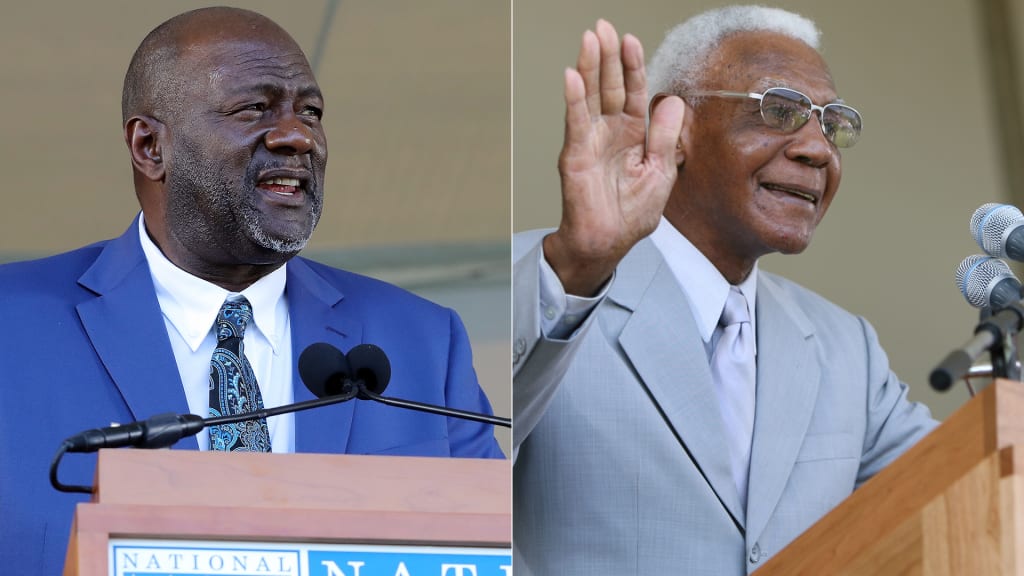
The Negro League Baseball Museum is celebrating the 100th anniversary of the start of the Negro Leagues, and MLB.com’s Bill Ladson has written a series of articles on some of the league’s legends. Today we spotlight the legendary Buck O’Neil, with recollections from Lee Smith.
Buck O’Neil became best known for his appearance in the Ken Burns documentary, “Baseball.” O’Neil cheerfully told stories about his days as a player/manager in the Negro Leagues, but perhaps less well-known is the fact that he was also one of the better scouts in Major League Baseball history.
O’Neil worked for the Cubs for many years as a scout/coach, and he signed Lee Smith to his first professional contract. Smith’s Hall of Fame career proved that O’Neil had an eye for talent. The intimidating right-hander became one of the best closers in baseball history, retiring with a then-record 478 career saves (he’s still third all-time behind Mariano Rivera and Trevor Hoffman) and making seven All-Star teams.
Smith had a brilliant 18-year career, starting with the Cubs in 1980 and ending with the Expos in 1997, with stops in Boston, St. Louis, New York (Yankees), Baltimore, Anaheim and Cincinnati. His best season came in 1991 as a member of the Cardinals. He finished second in the NL Cy Young Award voting behind Tom Glavine that year, saving a Major League-leading 47 games with a 2.34 ERA in 61 games. Smith, who was voted into the Baseball Hall of Fame by the Veterans Committee in 2019, joined Lou Brock as the second player signed by O’Neil to be enshrined in Cooperstown.
“Buck O’Neil loved Lee,” said Bob Kendrick, president of the Negro League Baseball Museum. “He was so proud of what Lee accomplished. I wish Buck was around when Lee was inducted into the Baseball Hall of Fame, because [O’Neil] had such a bond with this big country boy from Louisiana. They just hit it off. They had a kindred relationship for so many years. It was special to see the two of them together.”
Smith and O’Neil first met in 1974, when Smith was pitching for Castor High School in Louisiana. According to biographer, Joe Posnanski, O'Neil compared Smith to J.R. Richard, who would later become a power pitcher for the Astros. Although he was impressed with his first meeting with O’Neil, Smith still had dreams of becoming a NBA star. In fact, Smith called basketball his first love.
But Smith was surrounded by baseball royalty. As a teenager, he worked on a horse farm owned by former Major Leaguer Joe Adcock, who told Smith to listen to O’Neil. Adcock told Smith stories of playing against O’Neil in barnstorming games. Smith then started reading up on the Negro Leagues and learned, for example, that O’Neil was Satchel Paige’s roommate.
Smith and O’Neil didn’t just talk baseball; they talked about life. In time, Smith looked at O’Neil as a father figure. The biggest thing that impressed Smith was that O’Neil had thick skin. O’Neil was a guy who dealt with a lot of racism during his days in the Negro Leagues. Never once did he express bitterness toward anybody.
“Once I met O’Neil, it was unbelievable,” Smith said via telephone. “This man had a memory that was unbelievable. I remember seeing him 30 years later and the first thing he says to me was, ‘Lee Arthur, how is Ms. Bessie [Smith’s mother]?’ Man, he met my mom in 1975. He was just that type of guy. You think about how many people he met in coaching, scouting and playing. He remembered so much.
“All the things he had done, he never asked for anything in return. He was always giving. When you met him, you would never forget him. … You never heard a bad word about him. Everything was always positive, knowing what he had to go throw in the Negro Leagues, the things he had to overcome.”
Smith also had a positive attitude, and it paid off on the field, thanks to O’Neil. He wishes O’Neil had lived long enough see him get inducted into the Baseball Hall of Fame, but O’Neil passed away in 2006, 13 years before Smith went into Cooperstown.
“I don’t want people to remember him just in the baseball world,” Smith said about O’Neil. “It was about the people and the game. He signed me, Lou, Joe Carter and guys like that. But you look at the type of people that Buck was associated with, he was always trying to help someone. He wasn’t into it for himself. He was always trying to help people. He was so inspiring to people, but not just people in baseball.”
